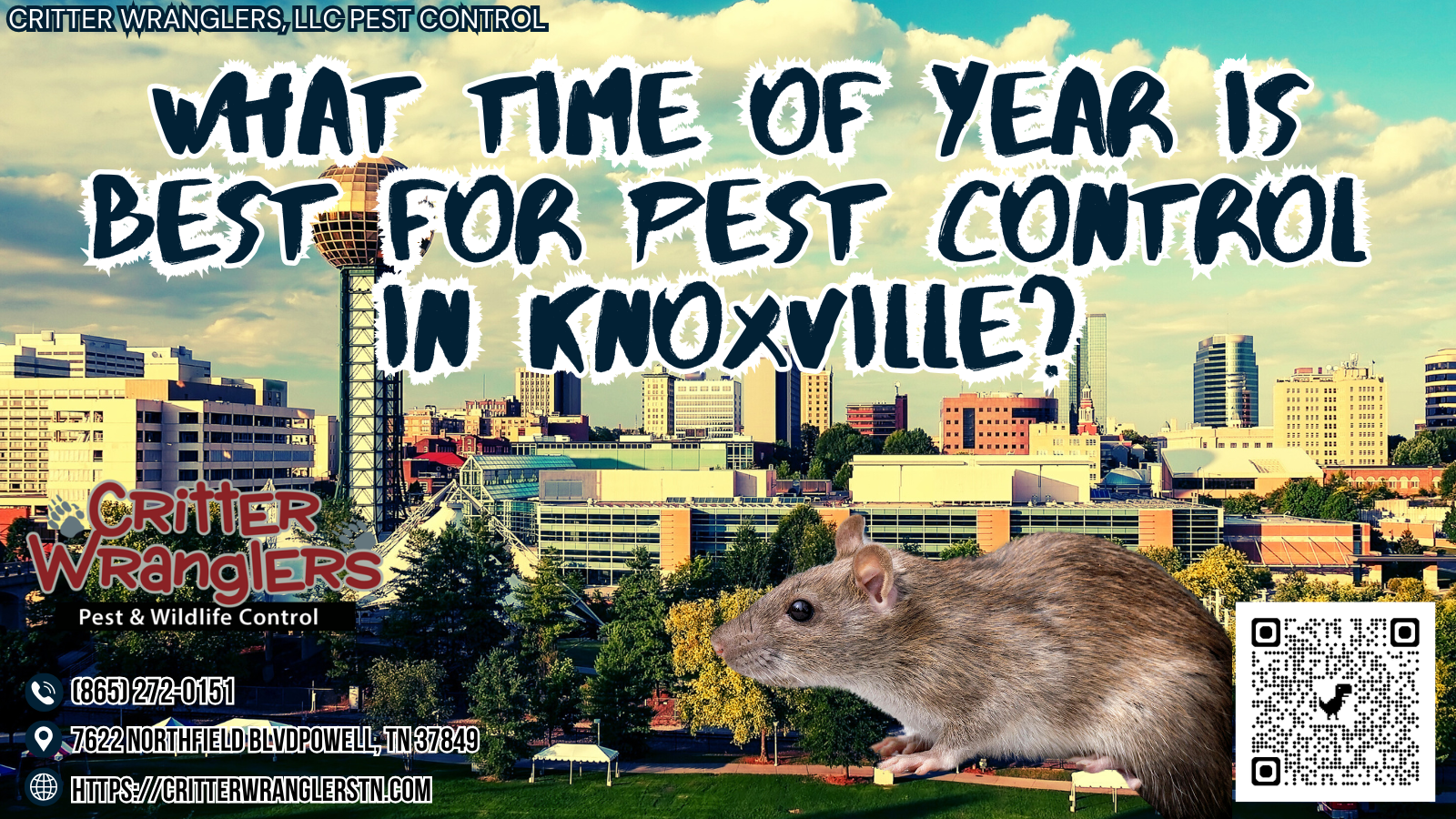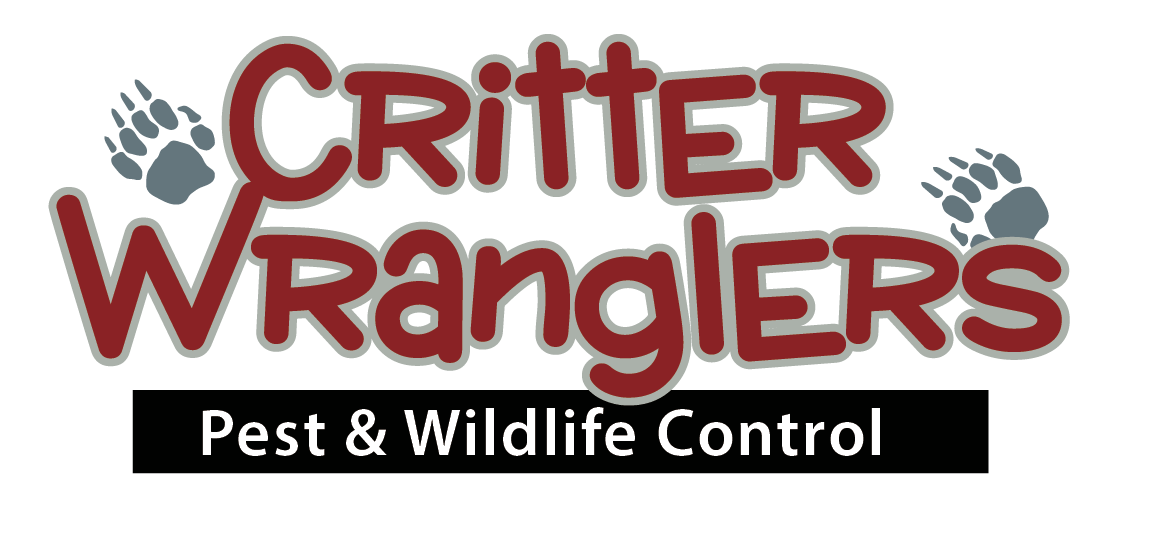Critter Wranglers, LLC Blog
Have an issue? Contact us today

What Time of Year Is Best for Pest Control in Knoxville?
The best time for pest control in Knoxville aligns with seasonal changes, particularly during spring and fall. In spring, pests like ants, termites, and mosquitoes become more active, posing serious risks. Effective early treatment can help manage these infestations. During the fall, taking preventive measures is essential, as pests seek shelter indoors. Cleaning up debris, sealing cracks, and ensuring proper home maintenance are key steps. Implementing strategies in these seasons can greatly reduce pest issues. To gain a deeper understanding of year-round pest control methods, it helps to explore additional insights and approaches.
Key Article Highlights
- Spring is ideal for pest control to prevent early infestations of ants, termites, and mosquitoes as they become more active.
- Summer requires regular outdoor treatments to manage increased pest populations effectively, particularly mosquitoes and ants.
- Fall is crucial for conducting cleanup and sealing entry points to prevent pests from seeking shelter indoors during winter.
- Winter pest control focuses on preventing rodent infestations as they seek warmth, making it important to seal gaps and store food properly.
- Regular inspections throughout the year help identify and address potential pest issues before they escalate, ensuring a pest-free environment.
Understanding Knoxville’s Climate
Understanding Knoxville’s climate is essential for effective pest control strategies. The city experiences distinct seasonal variations that considerably affect pest behavior. Warm summers can lead to increased pest activity, while cold winters often reduce their presence. During spring and fall, fluctuating temperatures can create favorable conditions for various pests to thrive. Recognizing these seasonal patterns helps in timing pest control efforts appropriately. The climate impact also determines which pests are prevalent at different times of the year. For example, certain insects may emerge earlier in a warm spring, necessitating timely interventions. By understanding Knoxville’s climate, residents can implement pest control strategies that are more effective and targeted, ensuring a healthier living environment throughout the year.
Spring Pest Activity
What pests emerge during the spring in Knoxville? As temperatures rise, several spring pests become active. Common spring pests include ants, termites, and mosquitoes. Ants begin to forage for food, often invading homes in search of sweets. Termites, particularly in swarming season, can cause significant damage if not identified early. Mosquitoes breed in standing water, making them a nuisance as outdoor activities increase. Proper pest identification is essential for effective control. Homeowners should look for signs of these pests, such as ant trails, termite wings, or mosquito larvae in water. Early detection and action can prevent larger infestations later in the season. Staying informed about spring pests helps maintain a pest-free home environment.
Summer Pest Control Strategies
As spring pests become a concern, summer brings its own set of challenges in pest control. During this season, outdoor treatments are essential for managing pests effectively. Regularly applying insecticides can help control populations of mosquitoes, ants, and other summer nuisances. Additionally, the use of insect traps is an excellent strategy for monitoring and reducing pest numbers. These traps can be placed in strategic locations around your home and yard to capture insects before they become a bigger problem. Maintaining a clean outdoor environment is also key; removing standing water and clutter can deter pests from taking up residence. By implementing these strategies, homeowners can enjoy a pest-free summer and protect their living spaces from unwanted invaders.
Fall Prevention Measures
Taking proactive steps during the fall can considerably reduce the risk of pest infestations as temperatures drop. Conducting thorough fall cleanup is essential. Remove debris, leaves, and clutter from your yard to eliminate potential hiding spots for pests. Seal any cracks or gaps in your home’s exterior to create effective pest barriers. Pay attention to entry points around windows, doors, and vents. Make sure that gutters are clean and functioning to prevent water accumulation, which can attract pests. Additionally, store firewood away from the home to deter insects. Regular inspections during this season can help identify potential issues before they escalate. By implementing these measures, homeowners can create a less inviting environment for pests as winter approaches.
Winter Pest Risks
Winter brings unique pest risks that homeowners should be aware of. Common winter pests include rodents and certain insects that seek warmth and shelter indoors. Taking preventive measures can help reduce these risks and keep your home pest-free during the colder months.
Common Winter Pests
While many people believe that colder temperatures eliminate pest problems, several common winter pests can still pose risks during this season. Rodent infestations are often a significant concern as mice and rats seek warmth and food inside homes. These pests can cause damage to property and contaminate food supplies. Additionally, holiday pests like spiders and certain beetles can invade homes during winter months, drawn in by festive decorations and warm indoor environments. Homeowners should be vigilant about sealing entry points and storing food properly to minimize the chances of an infestation. Understanding these common winter pests will help in maintaining a pest-free home during the colder months.
Prevention Strategies Needed
Implementing effective prevention strategies is essential to combat the risks posed by winter pests. Homeowners should focus on simple prevention techniques to reduce pest activity. First, seal any cracks or gaps in doors, windows, and foundations to eliminate entry points. Next, maintain a clean environment by promptly removing food waste and clutter. Regularly inspect and clean gutters to prevent water buildup, which can attract pests. Additionally, consider using natural repellents as proactive measures against common winter invaders. Finally, make sure that firewood is stored away from the home to deter rodents. By adopting these strategies, you can greatly lower the chances of pest infestations during the winter months, safeguarding your home effectively.
Year-Round Maintenance Tips
Maintaining a pest-free environment requires consistent attention throughout the year. One effective approach is to conduct seasonal inspections of your property. These inspections help identify potential pest problems before they escalate. Look for signs of infestation, such as droppings or nests, and address them promptly.
In addition to inspections, schedule routine treatments to prevent pests from entering your home. This can include sealing cracks, removing standing water, and keeping food stored properly. Regularly cleaning your home and yard also reduces attractants for pests.
Frequently Asked Questions
What Are Common Pests Specific to Knoxville?
Common pests in Knoxville include ants, termites, and mosquitoes. Their pest behavior aligns with seasonal patterns, leading to increased activity during warmer months. Understanding these patterns is essential for effective pest management and prevention strategies.
How Can I Identify a Pest Infestation Early?
Identifying a pest infestation early involves observing early signs, noting unusual pest behavior, and recognizing droppings or nests. Timely detection can prevent larger issues, ensuring effective intervention and maintaining a healthy living environment.
Are DIY Pest Control Methods Effective?
DIY pest control methods can be effective when using natural remedies. However, consistent pest prevention practices and proper identification of pests are essential for long-term success. Professional assistance may be necessary for severe infestations.
What Health Risks Are Associated With Pests?
Pests pose significant health risks, including the spread of pest diseases and triggering allergic reactions. Their presence can affect both physical health and overall well-being, making effective pest control essential for maintaining a safe environment.
How Much Does Professional Pest Control Typically Cost?
Professional pest control typically costs between $100 and $300 per visit, depending on the severity of the infestation. Service packages may offer discounts for multiple treatments, impacting overall pest control pricing considerably.
